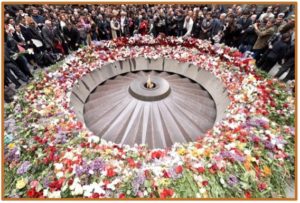We are pleased to make available readers’ theater plays that feature short narratives about ‘upstanders,’ people who acted heroically during genocides to rescue others, to tell the truth, or to bring perpetrators to justice despite difficult and dangerous circumstances.
Description
Readers’ theater is a style of theater in which the actors present dramatic readings of story-based material without costumes, props, scenery, or special lighting. Our scripts are available as Microsoft Word documents that can easily be edited or abridged to adapt to the desired use and audience. Visual impact is added through simple PowerPoint slides to be projected on a wall or a screen in the background.
The plays are easily and effectively done through electronic platforms such as Zoom as well as in person.
Details of use
The plays are available without fees or copyright restrictions. The material is not recommended for those under age 13. To request one or more plays, please complete our Upstanders Plays Request Form and return it to admin@worldwithoutgenocide.org
The only limitation is that the plays cannot be recorded or posted online by the users. They are available for one-time use through arrangement with World Without Genocide.
If you have questions, contact admin@worldwithoutgenocide.org
Current titles
- Upstanders: From the Armenian Genocide to Today
- Upstanders: Germans Who Saved Jews during the Holocaust
- Upstanders: Reporters with Courage
- Upstanders: The Warsaw Ghetto, the Uprising, and the Legacy
- A Century of Upstanders
- Ending Modern Slavery: Standing Up against Human Trafficking
- We’ve Reached the Boiling Point: Standing Up to Climate Change
- The Line
1. Upstanders: From the Armenian Genocide to Today
This play introduces the topic of genocide and why it is important to understand. We focus on the genocide of Armenians in the Ottoman Empire, known today as Turkey, and its legacy in the 21st century. During and after World War I, from 1915-1923, the Turkish government killed Armenians based on their religion and culture.
In 2021, the legacy of the Armenian Genocide remains alive in the Nagorno-Karabakh/Artsakh conflict between Armenia and Azerbaijan.
Some brave individuals sought safety and justice for the Armenians, from the Armenian Genocide to Nagorno-Karabakh. These upstanders include lawyer Raphael Lemkin, humanitarian Clara Barton, revolt leader Movses Der Kalousdian, Governor Celal Bey, U.S. Ambassador Henry Morgenthau, writer Armin Wegner, scholar Taner Akçam, writer Akram Aylisli, activist Mariam Khaloyan, and Turks who protected their Armenian neighbors. Their stories range in time and place, but they all did what they knew was right. This play details how they risked everything to stand up and speak out against atrocities and on behalf of those who were in danger.
2. Upstanders: Germans Who Saved Jews during the Holocaust
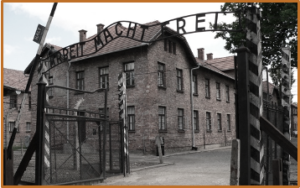 During the Holocaust, some very courageous Germans stood up against the Nazis. They had moral courage, the ability to sacrifice themselves for what is right in the face of opposition or danger. Their choices raise the question, Why do some people put the interests of others ahead of themselves? This play seeks to provide an answer by investigating remarkable, almost unbelievable, but true stories of altruism.
During the Holocaust, some very courageous Germans stood up against the Nazis. They had moral courage, the ability to sacrifice themselves for what is right in the face of opposition or danger. Their choices raise the question, Why do some people put the interests of others ahead of themselves? This play seeks to provide an answer by investigating remarkable, almost unbelievable, but true stories of altruism.
We tell the stories of widow Johanna Eck, Lutheran pastor Dietrich Bonhoeffer, history teacher Elisabeth Abegg, writer Armin Wegner, activist Sophie Scholl, German officer Dr. Fritz Fiedler, and countess Maria von Maltzen. These people sheltered Jews, helped some to escape execution, or publicly criticized the Nazi regime. They saved countless lives of friends and strangers alike. They knew what was right in a world that had gone tragically wrong.
3. Upstanders: Reporters with Courage
 A free press is a cornerstone of democracy, but this freedom has increasingly come under attack in recent years. Reporters are on the frontlines to tell the truth, often at great risk to themselves and their loved ones. This play tells the stories of reporters Anna Politkovskaya, Marie Colvin, Daniel Pearl, Maria Ressa, Svetlana Prokopyeva, Jamal Khashoggi, Daphne Caruana Galizia, Mohamed Fahmy, Amal Habbani, and Omar Jimenez. They have been persecuted for their reporting in Russia, Sri Lanka, East Timor, Syria, Pakistan, Philippines, Saudi Arabia, Malta, Egypt, Sudan, and the United States. They have been imprisoned, slandered, kidnapped, and even assassinated. Still, reporters continue to speak the truth and to encourage the world to stand against atrocity.
A free press is a cornerstone of democracy, but this freedom has increasingly come under attack in recent years. Reporters are on the frontlines to tell the truth, often at great risk to themselves and their loved ones. This play tells the stories of reporters Anna Politkovskaya, Marie Colvin, Daniel Pearl, Maria Ressa, Svetlana Prokopyeva, Jamal Khashoggi, Daphne Caruana Galizia, Mohamed Fahmy, Amal Habbani, and Omar Jimenez. They have been persecuted for their reporting in Russia, Sri Lanka, East Timor, Syria, Pakistan, Philippines, Saudi Arabia, Malta, Egypt, Sudan, and the United States. They have been imprisoned, slandered, kidnapped, and even assassinated. Still, reporters continue to speak the truth and to encourage the world to stand against atrocity.
4. Upstanders: The Warsaw Ghetto, the Uprising, and the Legacy
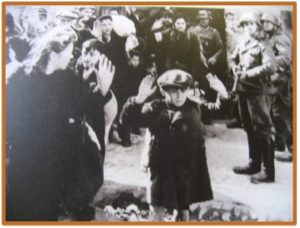 Hitler aimed to exterminate all Jewish people in Europe during World War II. Millions of Jews were imprisoned in crowded ghettos, where they faced starvation, torture, and disease. They were eventually removed and transported to extermination camps to be murdered. One of the most infamous ghettos was the Warsaw Ghetto in Poland. This play tells the stories of remarkable upstanders who helped the Jews of Warsaw and kept hope alive in the ghetto.
Hitler aimed to exterminate all Jewish people in Europe during World War II. Millions of Jews were imprisoned in crowded ghettos, where they faced starvation, torture, and disease. They were eventually removed and transported to extermination camps to be murdered. One of the most infamous ghettos was the Warsaw Ghetto in Poland. This play tells the stories of remarkable upstanders who helped the Jews of Warsaw and kept hope alive in the ghetto.
We honor humanitarian Irena Sendler, orphanage director Dr. Janusz Korzak, political activist Emmanuel Ringelblum, rebellion leader Marek Edelman, and the Catholic Poles who saved Yoram Israel Fridman. These upstanders saved thousands of lives, documented atrocities, and resisted Nazi tyranny. They stood up, even when they were standing alone. Today, as we see anti-Semitism on the rise around the world, it is essential to continue this legacy of standing up to hate.
5. A Century of Upstanders
 The world was silent as millions of innocent men, women, and children were killed in genocides over the past century. This play examines why and how a handful of individuals stood up or spoke out. We focus on ordinary people – from journalists to soldiers, students to scholars — who made a difference during the worst atrocities known to humankind.
The world was silent as millions of innocent men, women, and children were killed in genocides over the past century. This play examines why and how a handful of individuals stood up or spoke out. We focus on ordinary people – from journalists to soldiers, students to scholars — who made a difference during the worst atrocities known to humankind.
We tell the stories of lawyer Raphael Lemkin, soldier Armin Wegner, activist Irena Sendler, interpreter Dith Pran, American missionary Carl Wilkens, journalist Samantha Power, activists Katie-Jay Scott and Gabriel Stauring, gynecologist Dr. Denis Mukwege, and sexual slavery survivor Nadia Murad. They tried to prevent atrocities, save victims, and end impunity, from the Armenian Genocide to Cambodia, the Holocaust to the Democratic Republic of Congo, and more. The play ends by examining how we can all contribute to their mission of ending genocide.
6. Ending Modern Slavery: Standing Up against Human Trafficking
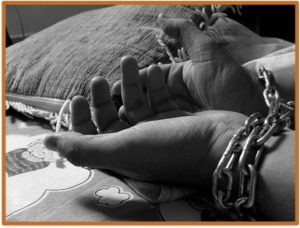 Human trafficking, a form of modern slavery, is the fastest-growing crime on the planet. People are used for forced labor, for harvesting of their body organs, or most commonly for sex. They are sold in this highly profitable industry that operates through local and international criminal networks. There are many roles in human trafficking: perpetrators, bystanders, victims, survivors, and upstanders. This play tells their disgusting, heartbreaking, and empowering stories.
Human trafficking, a form of modern slavery, is the fastest-growing crime on the planet. People are used for forced labor, for harvesting of their body organs, or most commonly for sex. They are sold in this highly profitable industry that operates through local and international criminal networks. There are many roles in human trafficking: perpetrators, bystanders, victims, survivors, and upstanders. This play tells their disgusting, heartbreaking, and empowering stories.
Over 40 million people are enslaved and 800,000 are trafficked internationally every year. The risk is highest for women and girls, LGBTQ+ individuals, youth, Indigenous peoples, and those made vulnerable by conflicts and natural disasters. We tell the stories of victims, and we highlight how individuals can protect themselves. Prevention is key in a world where perpetrators often have impunity and victims are often blamed.
We also discuss Upstanders who have set up reporting systems, pursued justice, and rehabilitated perpetrators. We honor the work of judge George Stephenson, Senator Sandy Pappas, attorney John Choi, hotel industry executives, FBI agents who apprehend traffickers, celebrities like Ashton Kutcher, and Executive Director of Breaking Free, Vednita Carter. Their stories remind us that with political will and courage, we can end modern-day slavery.
7. We’ve Reached the Boiling Point: Standing Up to Climate Change
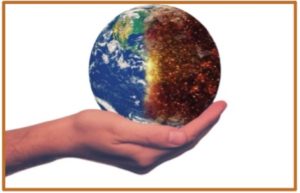 Our planet is heating up at an unsustainable rate. Humans burn fossil fuels –oil, coal, and gas—to power almost every aspect of our lives, which pollutes the atmosphere and traps in the heat from the sun. This causes more frequent and severe storms, fires, floods, and droughts. It is melting the Arctic and Antarctic ice so violently that major cities and entire island nations are at risk of being submerged under the rising ocean. It is triggering refugee crises, pandemic diseases, water shortages, food scarcity, and resource-driven conflicts around the globe.
Our planet is heating up at an unsustainable rate. Humans burn fossil fuels –oil, coal, and gas—to power almost every aspect of our lives, which pollutes the atmosphere and traps in the heat from the sun. This causes more frequent and severe storms, fires, floods, and droughts. It is melting the Arctic and Antarctic ice so violently that major cities and entire island nations are at risk of being submerged under the rising ocean. It is triggering refugee crises, pandemic diseases, water shortages, food scarcity, and resource-driven conflicts around the globe.
There is no longer any question whether humanity must change the way we treat our environment. The question now is Can we change? This play tells the stories of those who say yes, we can still save the world. We tell the stories of student activists Lukas Wrede and Xiuhtezcactl Martinez, non-profit founder Mindy Ahler, humanitarian worker Lindsey Smith, climate advocate Aji Piper, Paris Mayor Anne Hidalgo, environmentalist Bill McKibben, German Chancellor Angela Merkel, actor Leonardo DiCaprio, New Zealand Prime Minister Jacinda Ardern, Professor John Abraham, NGO director MacBain Mkandawire, explorer Will Steger, and Pope Francis. They believe that it is possible to change, but will we change? That decision is up to each of us.
8. The Line
The Line is short story of two different women living under the Nazi regime. One woman, Gertraud Traudl Junge, worked as Hitler’s last personal secretary. The other woman, Sophie Scholl, created the White Rose Resistance and was executed for it. Both were 21 years old.




